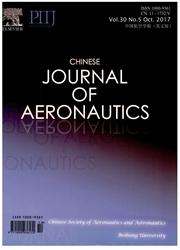

 中文摘要:
中文摘要:
To reasonably implement the reliability analysis and describe the significance of influencing parameters for the multi-failure modes of turbine blisk, advanced multiple response surface method(AMRSM) was proposed for multi-failure mode sensitivity analysis for reliability. The mathematical model of AMRSM was established and the basic principle of multi-failure mode sensitivity analysis for reliability with AMRSM was given. The important parameters of turbine blisk failures are obtained by the multi-failure mode sensitivity analysis of turbine blisk. Through the reliability sensitivity analyses of multiple failure modes(deformation, stress and strain) with the proposed method considering fluid–thermal–solid interaction, it is shown that the comprehensive reliability of turbine blisk is 0.9931 when the allowable deformation, stress and strain are3.7*10-3m, 1.0023*109 Pa and 1.05*10-2m/m, respectively; the main impact factors of turbine blisk failure are gas velocity, gas temperature and rotational speed. As demonstrated in the comparison of methods(Monte Carlo(MC) method, traditional response surface method(RSM), multiple response surface method(MRSM) and AMRSM), the proposed AMRSM improves computational efficiency with acceptable computational accuracy. The efforts of this study provide the AMRSM with high precision and efficiency for multi-failure mode reliability analysis, and offer a useful insight for the reliability optimization design of multi-failure mode structure.
 英文摘要:
英文摘要:
To reasonably implement the reliability analysis and describe the significance of influencing parameters for the multi-failure modes of turbine blisk, advanced multiple response surface method (AMRSM) was proposed for multi-failure mode sensitivity analysis for reliability. The mathematical model of AMRSM was established and the basic principle of multi-failure mode sensitivity analysis for reliability with AMRSM was given. The important parameters of turbine blisk failures are obtained by the multi-failure mode sensitivity analysis of turbine blisk. Through the reliability sensitivity analyses of multiple failure modes (deformation, stress and strain) with the proposed method considering fluid-thermal-solid interaction, it is shown that the comprehensive reliability of turbine blisk is 0.9931 when the allowable deformation, stress and strain are 3.7 x 10(-3) m, 1.0023 x 10(9) Pa and 1.05 x 10(-2) m/m, respectively; the main impact factors of turbine blisk failure are gas velocity, gas temperature and rotational speed. As demonstrated in the comparison of methods (Monte Carlo (MC) method, traditional response surface method (RSM), multiple response surface method (MRSM) and AMRSM), the proposed AMRSM improves computational efficiency with acceptable computational accuracy. The efforts of this study provide the AMRSM with high precision and efficiency for multi-failure mode reliability analysis, and offer a useful insight for the reliability optimization design of multi-failure mode structure. (C) 2016 Chinese Society of Aeronautics and Astronautics. Production and hosting by Elsevier Ltd. This is an open access article under the CC BY-NC-ND license.
 同期刊论文项目
同期刊论文项目
 同项目期刊论文
同项目期刊论文
 期刊信息
期刊信息
